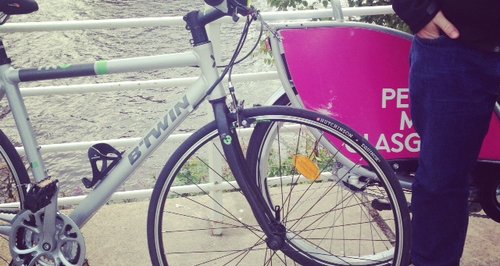On Air Now
Capital Breakfast with Fat Brestovci & Amy Meisak 6am - 10am
28 January 2019, 07:52 | Updated: 28 January 2019, 07:54

Tens of thousands of people would avoid life-threatening conditions if the increase in cycling in London was matched by other major cities, according to new research.
Walking and cycling charity Sustrans warned that these "substantial health benefits" are only possible with long-term political commitment and investment in cycling.
London has seen daily cycle journeys more than double since 2000 but levels have remained fairly static elsewhere, the report says.
An estimated 34,000 incidences of serious conditions such as Type 2 diabetes, stroke, breast cancer and depression would be prevented in seven UK cities if the number of cycling trips doubled every eight years between 2017 and 2040, researchers found.
In Edinburgh alone, cycling could prevent an estimated 4,400 incidences of such illnesses, it is claimed.
Sustrans calculated that, across the seven cities, this would equate to 242 million hours of additional physical activity, prevent 628 early deaths and generate £21 billion of savings to the economy over the 23-year period.
The cities included in the report were Belfast, Birmingham, Bristol, Cardiff, Edinburgh, Greater Manchester and Newcastle.
Sustrans said Scotland's capital has nearly 8% of commuter journeys now being made by bike.
It said the Scottish Government currently invests nearly £16 per head on walking and cycling, which contrasts with £2.16 in 2016/17 in England, outside of London.
John Lauder, national director at Sustrans Scotland, said: "Our report provides 34,000 reasons why governments across the UK should follow Scotland's example and prioritise investment in walking and cycling.
"Everywhere in Scotland, and right across the rest of the UK, is facing a physical inactivity and obesity crisis, which is why decision-makers need to get on the front foot and tackle these problems head on.
"Prevention is better than cure is an often repeated mantra of health ministers across the UK, but tackling the deepening health crisis shouldn't be left to the NHS alone.
"We call on communities in Edinburgh, and right across Scotland to embrace every day walking and cycling as a cheap and easy way to get regular physical activity."
Lesley MacInnes, the transport and environment convener for Edinburgh City Council, said: "Our vision for Edinburgh is a better connected, sustainable capital, and by investing in walking, cycling and public transport we are determined to achieve this - and to realise the immense health benefits that will result."